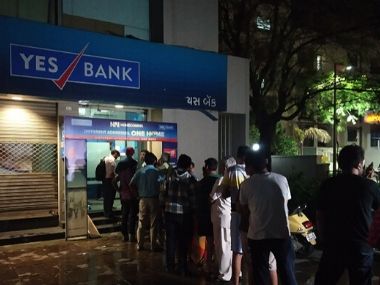The National Stock Exchange of India (NSE) announced that all existing futures and options (F&O) contracts of Yes Bank, across all expiries, will expire on 28 May.
BSE & NSE say no F&O contracts in #YesBank from May 29 pic.twitter.com/mlOMLAdE5k
— CNBC-TV18 (@CNBCTV18Live) March 6, 2020
In a circular issued on Friday, the NSE said that no futures and options contracts shall be available in Yes Bank for trading in equity derivatives segment from 29 May 2020, onwards. “The Exchange has decided that the existing futures and options contracts, across all expiries, shall expire on 28 May 2020. No futures and options contracts shall be available in Yes Bank for trading in equity derivatives segment from May 29, 2020, onwards,” a press release from NSE said. [caption id=“attachment_8124081” align=“alignleft” width=“380”]  Representational image. News18[/caption] The NSE further said, “The financial position of Yes Bank has undergone a steady decline largely due to inability of the bank to raise capital to address potential loan losses and resultant downgrades, triggering invocation of bond covenants by investors and withdrawal of deposits. The bank bas also experienced serious governance issues and practices in recent years which have led to a steady decline of the bank.” In a separate release, the NSE said that due to the recent development in Yes Bank, it has been decided that no fresh or renewal of bank guarantees and fixed deposit receipts issued by Yes Bank limited shall be accepted. Besides, NSE said the existing benefit provided to members towards bank guarantees and fixed deposit receipts issued by Yes Bank in favour of NSE Clearing will be reduced. On Thursday evening, capital-starved Yes Bank was placed under a moratorium in a rare move, with the Reserve Bank of India (RBI) capping deposit withdrawals at Rs 50,000 per account for a month and superseding its board. Yes Bank will not be able to grant or renew any loan or advance, make any investment, incur any liability or agree to disburse any payment. The RBI assured Yes Bank depositors that their interest will be fully protected and that there is no need to panic. The regulatory actions, undertaken by the RBI and the government, came hours after finance ministry sources confirmed that SBI was directed to bail out the troubled lender. For the next month, Yes Bank will be led by the RBI-appointed administrator Prashant Kumar, an ex-chief financial officer of SBI. The country’s financial sector is already reeling under a spate of setbacks, starting with the high quantum of dud assets at over Rs 10 lakh crore, their slow-paced resolutions despite legal teeth through bankruptcy laws, scandals at non-bank lenders like IL&FS and DHFL, and also fraud at cooperative lender PMC Bank. Following the RBI action against Yes Bank, shares in India’s fifth-largest private sector lender tumbled 25 percent to their lowest in over a decade on Friday. On the NSE, it plummeted 20 percent to Rs 29.45. Meanwhile, brokerages like Zerodha cancelled requests linked to the Yes Bank accounts and are seeking a change to other bank accounts so that funds are not blocked. The central bank capping depositor withdrawals at Rs 50,000 per account for a month has several implications in operations for the private lender’s customers. — With inputs from agencies


)

)
)
)
)
)
)
)
)



